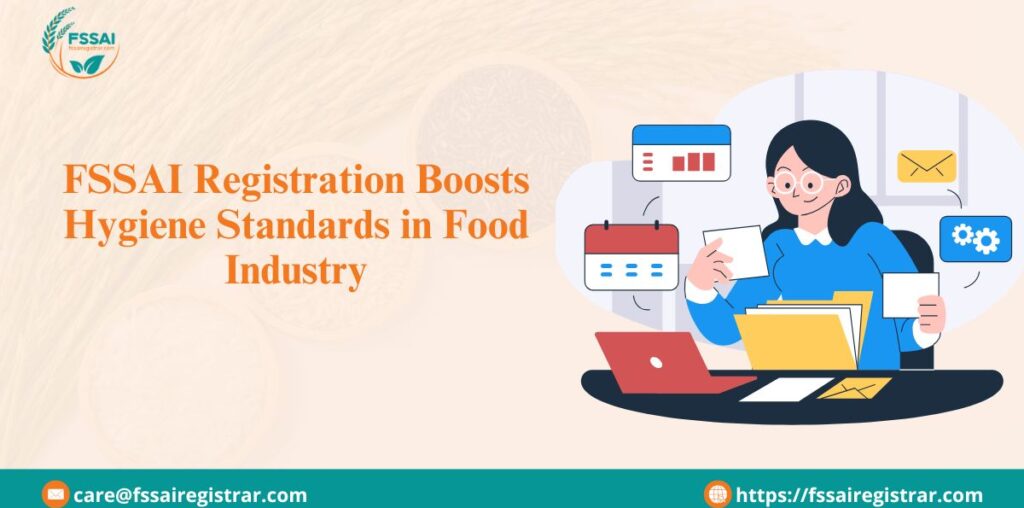In today’s world, food safety and hygiene are more important than ever. With the increasing number of food-related illnesses and growing consumer awareness about the quality of food, maintaining hygiene in the food industry has become a top priority. In India, the Food Safety and Standards Authority of India (FSSAI) plays a crucial role in ensuring that food businesses adhere to hygiene standards through mandatory registration and licensing. This article explores how FSSAI registration encourages hygiene in the food industry and why it is essential for both businesses and consumers.
What is FSSAI Registration?
FSSAI registration is a process that certifies food businesses in India, ensuring they comply with safety and hygiene standards set by the FSSAI. This regulatory body was established under the Ministry of Health and Family Welfare to protect public health by regulating and supervising food safety. FSSAI registration is mandatory for all food-related businesses, including manufacturers, retailers, and food service providers, whether they are small street vendors or large multinational companies.
The Importance of Hygiene in the Food Industry
Hygiene is critical in the food industry for several reasons:
- Public Health: Poor hygiene practices can lead to foodborne illnesses, which can be serious or even life-threatening. Ensuring that food is prepared and handled hygienically helps protect consumers from these health risks.
- Consumer Trust: When consumers see a food product with the FSSAI logo, it reassures them that the food has met government standards for safety and hygiene. This trust is vital for businesses to thrive.
- Regulatory Compliance: Food businesses are required to follow various hygiene regulations. Failing to comply can lead to legal consequences, including fines or closure of the business.
How FSSAI Registration Promotes Hygiene
FSSAI registration plays a significant role in promoting hygiene in the food industry in the following ways:
Setting Standards and Guidelines
The FSSAI has established clear standards and guidelines for food safety and hygiene. These include protocols for food preparation, handling, storage, and transportation. When businesses register with the FSSAI, they must adhere to these standards, ensuring that they maintain proper hygiene practices throughout their operations. This includes guidelines on employee hygiene, sanitation of equipment, and cleanliness of the premises.
Regular Inspections
Once a food business is registered with the FSSAI, it is subject to regular inspections by FSSAI officials. These inspections help ensure that businesses are complying with hygiene standards. During these visits, officials check for cleanliness, proper food storage, and safe food handling practices. If any violations are found, the business may be required to make immediate changes or face penalties. This oversight helps maintain high hygiene standards across the food industry.
Training and Awareness Programs
FSSAI also conducts training and awareness programs for food business operators and employees. These programs educate them about the importance of hygiene and safe food practices. By providing training on topics such as food safety management systems, personal hygiene, and sanitation practices, FSSAI helps food businesses understand their responsibilities and the steps they need to take to maintain hygiene.
Encouraging Best Practices
FSSAI registration encourages food businesses to adopt best practices in hygiene management. Registered businesses often invest in better facilities, equipment, and staff training to ensure compliance with FSSAI standards. This not only improves hygiene but also enhances the overall quality of food products. As businesses strive to meet and exceed FSSAI requirements, they contribute to a culture of hygiene and safety within the industry.
Consumer Awareness
With FSSAI registration, consumers become more aware of the importance of food hygiene. The FSSAI logo on products signals to consumers that the food they are purchasing has been vetted for safety and hygiene. This awareness encourages consumers to demand higher hygiene standards from food businesses, creating a positive feedback loop that motivates businesses to maintain and improve their hygiene practices.
Traceability and Accountability
FSSAI registration ensures that food businesses are accountable for their products. Each registered business is assigned a unique FSSAI license number, making it easier to trace the source of food products. This traceability is crucial in the event of a food safety issue, as it allows authorities to quickly identify the source of contamination and take appropriate action. Knowing that they can be held accountable encourages businesses to maintain high hygiene standards.
Facilitating Safe Food Practices
FSSAI registration requires food businesses to develop and implement food safety management systems (FSMS). These systems outline safe food practices that must be followed to ensure hygiene. By formalizing these practices, businesses are more likely to consistently adhere to them, reducing the risk of foodborne illnesses.
Encouraging a Culture of Safety
When businesses prioritize FSSAI registration and compliance, they foster a culture of safety and hygiene within their operations. This culture extends to employees, who become more aware of the importance of hygiene in food preparation and handling. As employees adopt good hygiene practices, food products’ overall safety and quality improve.
NOTE: To get your Tatkal FSSAI Registration Certificate, click APPLY FOR TATKAL FSSAI REGISTRATION
Conclusion
FSSAI registration is more than just a regulatory requirement; it is a vital step in promoting hygiene and safety in the food industry. By establishing clear standards, conducting regular inspections, and providing training and awareness programs, FSSAI is crucial in ensuring that food businesses maintain high hygiene standards. This not only protects public health but also builds consumer trust and encourages businesses to invest in better practices. As consumers become more aware of food safety, the demand for hygienic food products will continue to grow. By prioritizing FSSAI registration, food businesses can contribute to a healthier society while enhancing their credibility and marketability. Ultimately, FSSAI registration is an essential tool in the fight for food safety and hygiene in the food industry.




